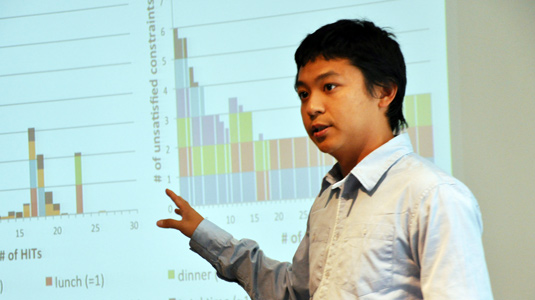Crowds and Communities: Haoqi Zhang Discusses Work in Crowdsourcing
Social computing systems can promote desired outcomes, Zhang said in Segal Seminar Series

Imagine you’re planning a trip to San Francisco and need help planning an itinerary. You consult Yelp and your Facebook friends about their favorite restaurants and tourist sites, but the feedback you get is confusing, sometimes contradictory, and leaves you inefficiently crisscrossing the city to get from point A to B.
Crowdsourcing could provide a better way, says Haoqi Zhang, assistant professor of electrical engineering and computer science in the McCormick School of Engineering and a faculty member in Northwestern’s Segal Design Institute.
“What we want is a structured, coherent itinerary” that meets our needs, Zhang said October 1 in a Segal Seminar Series lecture entitled “Crowds, Communities, and Mixed-Initiative Systems.” “Of course, that is harder than just collecting suggestions.”
Spanning the fields of computation and design, Zhang studies and designs social computing systems that promote desired behaviors and outcomes, such as engaging crowds and communities in problem-solving efforts. His programs, called “crowdware,” enable users to contribute while providing actionable feedback to indirectly coordinate their output. The goal is a result that is better than either humans or computers could create on their own.
“When we solve a problem, we don’t want to just use machines or just use humans. We want to use both,” Zhang said.
One example is Mobi, a tool Zhang created that uses crowdsourcing to plan custom trip itineraries. The program takes a request (“I want to take a two-day trip to San Francisco”) and special requirements (“I want to visit a museum, a park, and visit a café, but I don’t want to walk too much”), then crowdsources the requests to users, who create and refine an itinerary in a collaborative-workspace application. A crucial component is the “Brainstream,” a sidebar that suggests to-do items so users know what information or decisions are most needed.
Zhang has put the same process to work with conference planning, a huge undertaking in which organizers must separate presenters into themed sessions and schedule them; with hundreds of sessions, that can be a burdensome task. Called Cobi, Zhang’s program — created with partners from MIT, Carnegie Mellon, and the University of Washington — enables an academic community to plan a conference by “community-sourcing” to conference committee members as well as presenters, who weigh in about what sessions they should or should not be part of, as well as scheduling constraints. Cobi then uses these data to make sessions and develop a schedule.
The program not only makes planning more efficient, but makes the planning process more open.
“What does it mean to a community when the process is transparent, when (all the decisions aren’t made by) 10 people sitting in a room?” Zhang said.